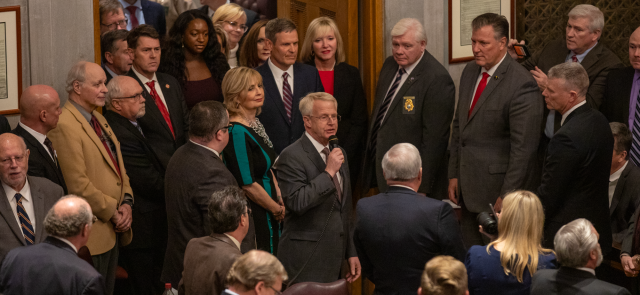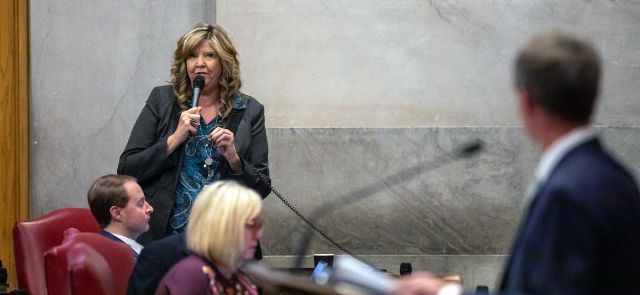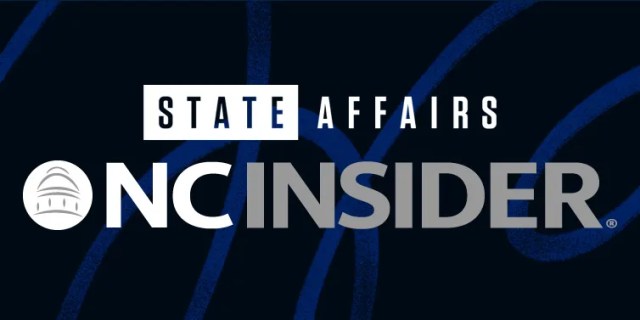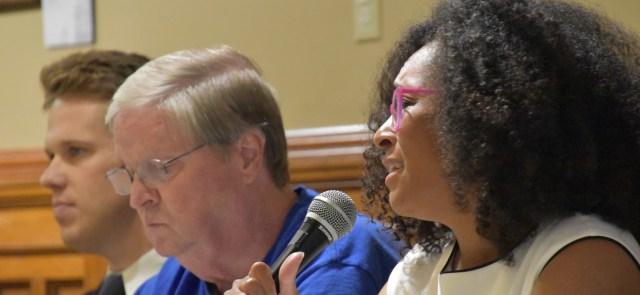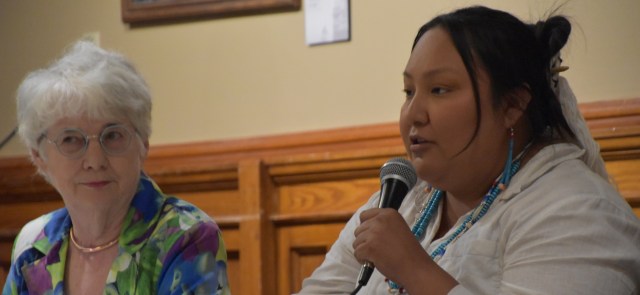YOU DON’T SAY
“I just decided it was time to move on.”
Emma Tate, director of the Pasquotank Board of Elections, on her decision to resign. (The Associated Press, 8/02/24)
Election Officials
The Associated Press, 8/02/24
A North Carolina county will soon lose its top two election administrators mere weeks before the first general election ballots go out to voters. The elections board in Pasquotank County accepted the resignation of Deputy Director Troy White last week, The Daily Advance of Elizabeth City reported.
White’s departure is effective Aug. 16, the same day that the resignation of Director Emma Tate takes effect. The upcoming departure of Tate was made public last month. Tate, who has served as permanent director since early 2020, told the newspaper that she decided to resign “for a multitude of reasons.”
“I just decided it was time to move on,” she added.
White declined to comment about the reasons for his resignation after Tuesday’s board meeting, which confirmed his departure.
The departures emphasize a turnover problem among local election directors over the past presidential election cycle in North Carolina and other states.
Pasquotank County has about 31,000 registered voters, compared with nearly 7.6 million recorded statewide. While in-person early voting for the Nov. 5 election begins Oct. 17, county boards will begin sending absentee ballots to those who have requested them on Sept. 6.
“Obviously, this is a difficult situation with fewer than 100 days before the election and a little more than a month before absentee ballots must be sent out,” State Board of Elections spokesman Patrick Gannon said. The state board will help the county as it works to fill the positions as soon as possible, he added.
In recent weeks, the five-member Pasquotank County board worked out with the state board how many early voting sites in the county would be open this fall.
In April, state elections Executive Director Karen Brinson Bell described to a General Assembly elections oversight committee staffing concerns within the state’s 100 counties. She said at the time that there had been 60 director changes since 2019, and that this year would mark the first presidential election in a permanent director’s role for at least 28 county directors.
Brinson Bell cited in part an environment in which “election professionals have faced continued hostility, harassment, substantial changes in their workload and the demands on them.”
Staffing has long been a challenge for election offices nationally, but 2020 was a tipping point with the pandemic-related challenges before the presidential vote and the hostility afterward driven by false claims of a rigged election. Other politically important states have also seen considerable turnover. For instance, 11 of Nevada’s 17 counties have had turnover in top county election positions since the 2020 election. [Source]
Robinson Ads
Gary D. Robertson, The Associated Press, 8/02/24
North Carolina Republican gubernatorial nominee Mark Robinson has been battered for months by his Democratic rival and other adversaries for seeking additional abortion restrictions beyond current state law and for past comments upbraiding women on the issue.
“Abortion in this country is not about protecting the lives of mothers. It’s about killing the child because you weren’t responsible enough to keep your skirt down,” Robinson said in a Facebook video in 2019, the year before he was elected lieutenant governor in his first bid for public office. Democratic nominee Josh Stein, the current attorney general and an abortion-rights supporter, has shown the footage in ads since June.
Now Robinson is attempting to shift the broader electorate’s views of him on the issue through empathy with a new commercial starting Friday that describes his wife’s own abortion decades ago and leaves the impression he’s comfortable with the state’s current 12-week ban on most abortions.
The policy shift would be significant for Robinson, whose campaign said earlier this year that he supported an abortion ban after roughly six weeks of pregnancy, with some exceptions. Many women don’t even know they are pregnant at six weeks. Previously, Robinson left the impression that he’d support something even more severe, saying in 2020, for example, that “for me, there is no compromise on abortion.”
For decades, the GOP campaigned on restricting abortion throughout the country. But as abortion rights have driven turnout for Democrats and appeared as a vulnerability for Republicans, Robinson’s approach reflects ongoing efforts by conservative politicians to appear moderate on abortion rights or avoid the topic altogether on the campaign trail — or otherwise risk losing at the ballot box in a post-Roe v. Wade world.
The stakes are high in North Carolina, where races for statewide office are usually close affairs and the winner of this closely watched gubernatorial campaign in November could have much to say about whether the Republican-controlled General Assembly will be able to advance its conservative agenda without resistance.
The campaign ad on television and on digital platforms shows Robinson and his wife Yolanda Hill holding hands. They discussed her abortion publicly in a 2022 video, but the potential audience now is much greater. “Thirty years ago, my wife and I made a very difficult decision. We had an abortion,” Robinson says in the ad, adding that it was like a “silent pain between us that we never spoke of.”
Hill added: “It’s something that stays with me forever.”
“That’s why I stand by our current law,” Robinson goes on to say, pointing to what he calls “common-sense exceptions” for pregnancies through incest and rape and when the life of the mother is in danger.
Asked Friday whether Robinson was altering his views on abortion, campaign spokesperson Mike Lonergan said that “the legislature has already spoken on this issue.”
If elected governor, Robinson “will work to make North Carolina a destination for life by building a culture that does more to support women and families, including bolstering adoption, as well as foster and childcare,” Lonergan added.
Stein’s campaign said later Friday that the Robinson ad was the “latest example of him running away from his extreme and toxic stance on abortion.” Stein’s team has alleged that Robinson would seek an abortion ban with no exceptions if elected.
“If North Carolinians want to know where Mark Robinson really stands on abortion, they should listen to every other comment he’s made on the issue before today,” Stein campaign spokesperson Morgan Hopkins said. [Source]
Campaign Dispute
Galen Bacharier, NC Newsline, 8/02/24
Attorneys for Lt. Gov. Mark Robinson’s campaign sent a cease-and-desist letter to Attorney General Josh Stein’s campaign after they aired an ad focusing on the daycare formerly operated by Robinson.
The ad, “Unsafe,” details state citations of Precious Beginnings, a Greensboro daycare, from 2006 and 2007. Robinson’s attorneys alleged in a letter that the ad “includes a series of misleading statements, visuals that distort the truth, and false assertions regarding the content of state records.”
“This letter puts Josh Stein and his campaign on notice that this advertisement contains false and defamatory information,” attorneys Charles Spies and Benjamin Mehr wrote. “Both Josh Stein personally and his campaign will bear liability if the advertisement continues to air.”
Stein’s campaign is standing by the ad.
“The ad is factually accurate, based on publicly available information, and, to date, the Robinson campaign has yet to provide any new factual information to refute the ad’s claims,” Stein’s campaign manager Jeff Allen said in a statement. “Mark Robinson may want to hide his record from North Carolina voters, but the voters deserve to know it.”
The attorneys write that the ad’s claim that “state documents show (the daycare) was unsanitary and endangered children” is inaccurate and misleading. The center “was occasionally cited on technicalities,” they write, but “no official documents state” that it was unsanitary or endangered children.
Among their other complaints were graphics “showing an electrical socket out of the wall around children,” which they said did not happen at the center. They accused the Stein campaign of treating allegations that the center operated without lights, heat or running water as fact.
Stein faced a grand jury investigation in a case stemming from a 2020 campaign ad, in which his opponent alleged the ad violated a 91-year-old libel law. The case was eventually dismissed. [Source]
Chemical Removal
William Tong and Adam Wagner, The News & Observer, 8/02/24
Drinking water systems in North Carolina are racing to build drinking water treatment systems that will let them meet the U.S. Environmental Protection Agency’s new drinking water limits for several forever chemicals.
In April, the EPA approved rules for several per- and polyfluoroalkyl substances. Scientific research conducted over the last few decades has linked PFAS with increased risk of certain cancers, cardiovascular disease and lower birth weight, said Melanie Benesh, vice president of government affairs at the Environmental Working Group.
The EPA rules, which administrator Michael Regan announced at a Fayetteville water treatment plant, set drinking water standards known as maximum contaminant levels for six different PFAS. Notably, the agency set the standard at 4 parts per trillion for PFOA and PFOS, two of the most common forever chemicals found in water.
That’s the lowest level a utility can reliably detect, Benesh said. “For compliance purposes, they set it at that level,” she said. “But really, if you look at what they consider safe levels, they’re pretty close to zero.”
The N.C. Department of Environmental Quality is pushing for limits for several forever chemicals in groundwater and surface water. Part of the reason department leaders say they are calling for the surface water limits, in particular, is that cutting down on the amount of forever chemicals in raw water will help downstream utilities reduce their treatment costs, including increasing the amount of time filters can last before becoming saturated.
In recent years, many Triangle water utilities have measured forever chemicals at levels that fluctuate above and below the new regulations, which the EPA doesn’t intend to enforce until 2029. Here’s how some are planning to address PFAS in the coming years.
As part of its existing treatment process, Raleigh Water is already injecting powder-activated carbon into the water it draws from Falls Lake and Lake Benson. Utilities frequently use powder-activated carbon to improve taste and odor in their finished drinking water, with the carbon settling out later in the treatment process. Raleigh Water has typically measured PFOA levels between undetectable and four parts per trillion, with PFOS levels ranging slightly higher, from undetectable to 5.5 ppt. To ensure that it can push levels of PFOA and PFOS below the new four parts per trillion drinking water standard, Raleigh Water plans to increase the amount of powder-activated carbon it uses.
Raleigh Water has embarked on a $12 to $14 million project to build a pair of 80,000-pound silos to keep powder-activated carbon on-site at the E.M. Johnson Water Treatment Plant in Northeast Raleigh. Buchan said the project, which will also include the capacity to inject up to 30 to 35 parts per million of powder-activated carbon into raw water, is slated for completion by December 2025.
“It’s not like we’re investing in a chemical system that we weren’t already using, we’re just going to have to improve it and make it more robust,” Whit Wheeler, Raleigh Water’s executive director, told N.C. Department of Environmental Quality Secretary Elizabeth Biser and U.S. Representative Deborah Ross during a June tour of the Johnson plant. [Source]
Harris Outreach
Galen Bacharier, NC Newsline, 8/04/24
Vice President Kamala Harris’ campaign is launching a coalition to organize independents and moderate Republicans and tapping a former state Supreme Court Justice to lead the effort in North Carolina.
Bob Orr, who served on the North Carolina Supreme Court for nearly a decade and was a candidate for governor in 2008, will lead the campaign’s “Republicans for Harris” organization in the state. The coalition plans to host events, knock doors, phone bank, write letters to the editor and build a network specifically designed to reach independent and moderate Republican voters — across North Carolina, other battleground states and nationally.
“As we approach the final days of this election, there has never been a more important time for Republicans, former Republicans and unaffiliated voters who lean Republican, to come together and put country over party by working to elect Kamala Harris and stopping Donald Trump,” Orr said in a statement. He said the urgency of the election “requires action from all of us, regardless of party affiliation, to work together to save our democracy.”
Orr served as an associate justice on the high court from 1995 to 2004. He ran for the Republican gubernatorial nominee in 2008, losing a primary to former Gov. Pat McCrory. More recently, he has been involved in North Carolina’s redistricting process, filing a suit against GOP-drawn maps that was later dismissed.
In 2016, when Orr called Donald Trump “a danger to the country,” his credentials as a Republican presidential delegate were withheld. He officially left the party in 2021, and is now registered as an independent.
Harris’ campaign, as it builds on a surge of fundraising and support, argues that Trump’s campaign and modern agenda has iced out scores of Republicans who no longer back him.
Austin Weatherford, the campaign’s director of Republican outreach, said the VP’s team was “working overtime to earn the support of my fellow Republicans who care about defending democracy and restoring decency.” [Source]
Summer Weather
Jane Winik Sartwell, Carolina Public Press, 8/02/24
North Carolina agriculture is bouncing back thanks to recent rain after a drought devastated crops earlier this summer, though one county — Yadkin County, in the northwest Piedmont — remains in a severe drought.
Drought conditions lifted just as suddenly as they started, with many counties, particularly in the eastern half of the state, receiving rainfall totals more than 10 inches higher than their July averages.
Parts of Richmond County, along the central South Carolina border, received 20 inches of rain in the last two weeks of July alone. Thanks to the downpour, the county’s biggest crops — cotton and hay — both stand a chance after the brutal drought. The same is true for soybeans, tobacco, and sweet potatoes.
The county’s peach farmers say they have more fruit than they know what to do with. “That was the most rain I can remember, except Hurricane Florence back in 2018,” Anthony Growe, field crops extension agent in Richmond County, told Carolina Public Press. “But it kind of looked like a hurricane came through there. Trees started falling over because the ground was so wet, and roads were washed out.”
Growe, like many farmers in the area, had large areas of standing water in his fields. He could not take his equipment out into them to cut and bail the hay when the time came. “Four to five weeks of growth for hay is ideal,” Growe said. “If you have to wait eight or nine weeks, like I did, and many farmers around here did, the nutritional value of the hay plummets quickly.”
Because Richmond is primarily a livestock county, the quality of hay is an important economic indicator.
July’s deluge came after six full weeks of negligible rainfall in the county. The corn crop in Richmond County is beyond hope, an unfortunate truth across much of the state. Even the cotton, a very drought-resistant crop that thrives in hot temperatures, shows signs of drought stress.
In Pitt County to the northeast, estimates anticipate a $10 million loss in corn. Corn has a very tight window of pollination in June, and those weeks were bone dry. From June 8 to June 30, the rainfall total in Pitt County was exactly zero: a record 23 days without precipitation. “We could not find a happy medium this season: either we got too much rain, or not enough,” Jonathan Smith, field crops extension agent in Pitt County, told CPP.
Of the ears of corn that actually grew in North Carolina fields this summer, many fell victim to mold due to the wet weather of the last few weeks.
Greenville, Pitt County’s county seat, received more rainfall in the six days between July 22 and July 27 than the yearly average for the entire month of July. The total for this July was 15 inches, compared to the average of 5.86 inches.
Across the state in Yadkin, a severe drought persists, with a 3.09 inch rainfall deficit remaining in Yadkinville since June 1, despite recent rains. “The eastern counties in the state were able to get that rain a week or two before we were, but last week we were finally able to get a lot of rainfall,” Ryan Coe, Yadkin County extension agent, told CPP.
“Reports were around 1 to 3 inches of rain. That’s the first significant rainfall since early June. “It’s finally starting to turn things around. It’s good to see people mowing their lawns again. The corn crop is definitely hit the hardest, but this rain could turn the tobacco and soybean crop around to finish out the growing season.” [Source]
Clifton Dowell, State Affairs Pro, 8/02/24
The news leader of Durham’s Indy Week, a free alternative publication that celebrated its 40th anniversary last year, has said she’ll step aside to focus on expanding the publication’s coverage area to Raleigh.
Editor-in-Chief Jane Porter said in a letter published Aug. 1 that she’ll transition to a new role as a senior reporter and contributing editor dedicated to covering Raleigh and Wake County.
“We think Raleigh and Wake County need and deserve free, extensive politics and government reporting, coverage of growth and development issues, deep looks at housing, education, the environment, and more,” she wrote. “We want to bring the strong daily and enterprise reporting that the Indy is known best for in the Bull City to the City of Oaks.”
That coverage will not extend to the North Carolina General Assembly, Porter said in an email to State Affairs.
“Currently, the Indy does not report on the NCGA and I don’t expect that to change,” she said. “Our partner organization The Assembly does quite a bit of reporting on state politics and we have chosen to focus on the hyperlocal: municipal, county-level, local school boards, etc.”
Indy Week began a partnership with The Assembly last year. Axios Raleigh reported in May 2023 that the partnership could lead to the company acquiring Indy Week. In the meantime, Porter said a new editor-in-chief will be hired.
Summerfield Annexation
Chris Burritt, The NW Observer, 8/02/24
The Summerfield Town Council voted 4-1 yesterday afternoon to retain Raleigh law firm Robinson, Bradshaw & Hinson to explore the town’s legal rights after the state legislature’s vote in June to de-annex nearly 1,000 acres.
The council voted after meeting in closed session for nearly two hours during a special call meeting. Town Attorney Jim Hoffman and Matthew Sawchak, of the Robinson law firm, participated in the closed session. Council members Janelle Robinson, John Doggett and Heath Clay attended the meeting in person; Mayor Tim Sessoms, Mayor Pro Tem Lynne W. DeVaney and council member Jonathan Hamilton were out of town but participated remotely.
Council members declined to discuss details of possible litigation, including the timeline, potential cost in legal fees, and likelihood of being successful should the town engage in a legal battle. Presumably, the town would sue the state legislature since it voted to de-annex the land in June.
Doggett cast the only vote in opposition to hiring the Robinson law firm. He said suing to overturn the de-annexation of developer David Couch’s property would result in excessive legal fees, which have skyrocketed over the last several months, while offering little hope of being successful. He also expressed concern that the action could put the town at greater risk of losing its charter, which some state legislators proposed for consideration before they voted on de-annexing Couch’s property in June. [Source]
Ballot Lawsuit
WRAL News, 8/02/24
Third-party presidential candidate Cornel West is joining a lawsuit brought against North Carolina elections officials, alleging that their decision to keep West’s Justice For All Party off ballots in the state was politically motivated.
“The North Carolina Board of Elections received undue influence from the Democratic Party and their allies, resulting in significant procedural failures during the signature-verification process for the Justice for All Party’s ballot access efforts,” West’s campaign said in a statement Friday.
Three registered North Carolina voters sued the state elections board last week, alleging it violated their constitutional rights by rejecting a petition drive seeking recognition for a political party that would put West on the presidential ballot. The lawsuit was filed by a registered Democrat and two unaffiliated voters whose signatures were among those collected.
The lawsuit was filed on July 22, days after the election board’s Democratic majority refused to certify the Justice for All Party of North Carolina. A spokesman for the elections board didn’t immediately respond to a request for comment on Friday.
The lawyers who filed the litigation have a history of defending Republican causes. The lawsuit alleges the state board hasn’t provided Justice for All with specific evidence to discredit the more than 17,000 signatures that were validated. The plaintiffs want a judge to rule that Justice for All is an official party that can place candidates’ names up and down the ballot. State election officials have said mid-August is the deadline for parties to name their presidential candidates.
The West campaign said it has secured ballot access in 14 other states, but acknowledged some certifications must still be finalized. [Source]
Literary Assessments
David Beasley, The Center Square, 8/03/24
From kindergarten through third grade, North Carolina public school students scored higher than the national average on literary assessments at the end of last school year, state officials said. The assessment is called Dynamic Indicators of Basic Early Literacy Skills, also known as DIBELS.
Educators credit the improvement to the statewide launch of a program called Language Essentials for Teachers of Reading and Spelling, also known as LETRS. That two-year program for K-3 teachers started during the 2021-22 school year. As of June, all teachers in those grades had completed the training, which provides instructional tools on the science of reading.
“They call it the ‘science’ of reading because, like any scientific concept, these methods are grounded in research and data,” said State Superintendent Catherine Truitt. “When we implemented LETRS, we knew we’d see results. But to have so many students improve this early in our state’s new literacy journey is a wonderful surprise. It speaks to the dedication of our teachers and the efficacy of the professional development coordinated by North Carolina Department of Public Instruction’s Office of Early Learning.”
It was the third consecutive year that K-3 students scored above the national average of the DIBEL test.
The number of North Carolina students who met or exceeded benchmarks for improvement on the DIBELS test from the beginning of the 2023-24 school year through the end of year, increased by 81,616, the state said. Also, 53,808 fewer students fell below the benchmarks.
The largest gains were in kindergarten, with a 40% increase in the number on track in reading. This compared to an average of 25% in other states. [Source]
Statesville Elections
Ben Gibson, The (Statesville) Record & Landmark, 8/02/24
The Statesville City Council hopes to increase turnout in its municipal elections by moving the odd-year contests from October to November. A public hearing on the matter is scheduled during Monday’s regular City Council meeting at 6 p.m.
The city’s action request noted that fewer than 8,000 people — there are 28,419 residents, according to the 2020 census — participated in the last four municipal elections. Officials said the potential move would expand opportunities for residents to voice their opinions and allow them to vote in each of the city’s elections.
The change would also give the lowest at-large vote-getter in the upcoming 2025 election a two-year term, instead of a standard four-year term, to accommodate the transition. The 2027 city election would see the at-large position revert to a four-year term.
Iredell County Democratic Party chair Beth Kendall said she supported the change and said it would provide more consistency.
“People are thinking about voting in November, less so in October,” Kendall said. She said while she didn’t believe a change would benefit or hurt either of the county’s two major political parties, she said the Democratic Party is always supportive of any changes that make it easier for residents to vote.
Iredell County’s Republican Party chair Gary Robinson said the matter has been discussed individually among members but not in a group setting. He said it could be discussed at the GOP’s meeting later this month. [Source]
Emission Inspections
Peter Castagno, Port City Daily, 8/04/24
The North Carolina Department of Air Quality determined the state can meet federal air requirements without annual vehicle emission inspections for 18 counties, but environmentalists argue the change will harm public health even if air pollution levels remain under legal limits.
The 1970 Clean Air Act gave the U.S. Environmental Protection Agency the authority to create the National Ambient Air Quality Standards. North Carolina previously required vehicle emission inspections in 48 counties to meet federal standards but a series of rollbacks reduced the figure to 19.
Last year’s budget included provisions prohibiting state agencies from enforcing emission standards for new vehicles and eliminated annual emissions inspections. The rules countered Gov. Roy Cooper’s 2022 executive order aiming to expand the state’s electric vehicle industry and reduce carbon emissions in the transportation sector. The legislation directed the Department of Environmental Quality to create a plan to maintain federal air quality standards without car pollutant tests. The agency published an analysis Friday finding every county would stay under the limit without inspections and submitted it to the EPA for final approval.
The budget provision is similar to legislation introduced by Sen. Steve Jarvis, R-Davidson, and Carl Ford, R-Rowan, last year, which also would have rolled back annual safety inspections to every-other year. The bill didn’t make it out of the Senate Transportation Committee.
Critics of annual inspections, such as the John Locke Foundation, have argued the program is ineffective and corrupted by fraud. The Department of Justice fined a Charlotte auto repair owner $1.2 million for carrying out fraudulent emission inspections last year.
Alternatively, environmentalists including Grady McCallie — policy director of the North Carolina Conservation Network policy — argue it is unwise to take advantage of the state’s air quality gains by rolling back environmental regulations.
“I think it’s short-sighted,” Southern Environmental Law Center Brooks Pearson told PCD.
Two decades ago, North Carolina’s air ranked among the most-polluted in the nation. McCallie credited the 2002 Clean Smokestacks Act, which required significant emission reductions from the state’s coal plants, for recent air quality improvements. “I think it is fair for folks to look at this and say, it may be that the Clean Air Act allows this to be removed,” he said. “But it’s not good for public health.”
McCallie said air pollution levels are calculated broadly at the state level and do not focus on individual health impacts of residents living near congested roadways. “If you live near a road you’re getting exposed to a lot of pollution,” he said. “And for those folks vehicle inspections matter.”
Environmentalist groups have called for greater reform in the transportation sector — the state’s top source of carbon emissions — such as increasing public transit options. Those efforts have been stymied by a 2013 state law requiring the majority of North Carolina’s infrastructure investments to go to projects that benefit drivers. [Source]
Pinehurst Circle
Sandhills Sentinel, 7/31/24
The N.C. Department of Transportation will continue receiving comments and questions from the public on potential improvements to the Pinehurst Traffic Circle well into August. Three public meetings were held earlier this month for the public to see preliminary project designs, traffic data, and speak with engineers directly.
Transportation officials spoke with several hundred citizens at the public meetings and have received nearly 1,000 comments as of July 31.
After the comment period ends on Aug. 23, NCDOT officials will take several weeks to read, analyze, and organize all comments and questions. NCDOT has heard the community’s concerns and is already reviewing all concepts and looking for opportunities to minimize the area’s impacts. The department plans to improve the design based on the local input received and ensure traffic safety and mobility are maximized. [Source]
Judicial Appointments
News Release, 8/02/24
Friday, Gov. Roy Cooper announced two appointments to the North Carolina District Court.
“Both of these appointees bring a wealth of legal experience to the bench and will make excellent judges in their respective districts,” said Cooper. “I’m grateful for their dedication to the people of North Carolina and their willingness to serve our state in these new roles.”
B. Ashley Andrews has been appointed to serve as District Court Judge in Judicial District 27, serving Rowan County. She will fill the vacancy created by the retirement of Judge R. Marshall Bickett. Andrews is the owner of B. Ashley Andrews, Attorney at Law, PLLC and serves as privately assigned counsel for Indigent Defense Services.
Kristy L. Parton has been appointed to serve as District Court Judge in Judicial District 43, serving Cherokee, Clay, Graham, Haywood, Jackson, Macon and Swain counties. She will fill the vacancy created by the appointment of Judge Tessa Sellers to the Superior Court. Parton currently works as a solo practitioner at her own practice, Kristy L. Parton, Attorney at Law. She also serves as a guardian ad litem for the Eastern Band of Cherokee Indians Family Safety Court, as a guardian ad litem attorney advocate in Jackson County and as an attorney for the Swain County Department of Social Services.
Sheriffs’ Association
Mike Conley, McDowell News, 8/04/24
McDowell County Sheriff Ricky Buchanan was elected the first vice president of the North Carolina Sheriffs’ Association at a conference last week. Buchanan was one of five North Carolina sheriffs elected to new roles on the association’s executive committee at the conference, according to a release from the McDowell County Sheriff’s Office.
“I am honored to take on the role of first vice president of the association and work with such an excellent group of my fellow sheriffs over the coming year,” Buchanan said. “The association’s annual business conference is always an excellent opportunity for learning and networking so we, along with our personnel, can continue to stay focused on emerging trends in law enforcement and find more ways to enhance public safety in the communities we protect.”
Other sheriffs newly elected to positions on the executive committee are:
- President: Chatham County Sheriff Mike Roberson
- Second vice president: Edgecombe County Sheriff Clee Atkinson
- Third vice president: Stanly County Sheriff Jeff Crisco
- Secretary: Stokes County Sheriff Joey Lemons
Iredell County Sheriff Darren Campbell, who currently serves as president, will transition to the role of chairman of the executive committee. Cabarrus County Sheriff Van Shaw was reelected as treasurer, the release said. [Source]
Business Park
The Robesonian, 8/03/24
A $1.375 million grant from the Golden LEAF Foundation is earmarked for Robeson County to develop a preliminary design plan for an 80,000-square-foot shell building at the COMtech Business Park.
The empty building, which would be expandable to 142,000 square feet, is expected to bring a business that would invest $9,152 million in private capital and the creation of 75 jobs with an average salary of $45,000, according to the Golden LEAF Foundation, which announced its Shell Building Pilot Program funds Thursday.
According to a prepared statement, the Golden LEAF Foundation Board of Directors awarded $9.6 million in funding for seven projects through the Shell Building Pilot Program in Robeson, Bladen, Scotland, Ashe, Columbus, Franklin and Halifax counties.
The North Carolina General Assembly provided $10 million to the Golden LEAF Foundation to implement the Golden LEAF Shell Building Pilot Program. Under the authorizing legislation, governmental and charitable nonprofit entities in Ashe, Bladen, Columbus, Franklin, Halifax, Robeson, and Scotland counties are eligible to apply for funding. The program is intended to provide grants to increase the number of available publicly-owned industrial buildings suitable for new or expanding businesses, other than retail, entertainment, or sports projects. [Source]
Police Lawsuit
DJ Simmons, WFDD Radio, 8/02/24
A woman who alleges she was in an intimate relationship with Winston-Salem Police Chief William Penn is now suing him for defamation of character and emotional distress. The lawsuit filed by Quamekia Shavers states she became pregnant in June 2023 after having unprotected sex with Penn. The filing says she felt pressured by the defendant to then have an abortion.
According to the lawsuit, Penn gave her money for the procedure but following an argument stopped receiving her calls. The filing also says she was “troubled by dreams of hearing babies leading to a decrease in her sleep duration.”
Shavers in her lawsuit says she received a letter in September 2023 from attorney Michael Grace, who represents Penn. Grace was not immediately available for comment Friday. Shavers alleges she was threatened she would be charged with a crime if she kept contacting Penn. She says in her suit these legal accusations were a form of intimidation and a tactic intended to cause distress. Shavers is seeking $50,000 in punitive damages. [Source]
Residency Program
The (Elizabeth City) Daily Advance, 8/02/24
Sentara Health says it will roughly double its number of residency positions over the next six years to address an impending physician shortage, with some of those new doctors completing their training at Sentara Albemarle Medical Center.
The Norfolk, Va.-based health system announced last week it plans to increase its residency and fellowship positions at Sentara Norfolk General Hospital from 240 and establish new residency programs at four Sentara hospitals, including SAMC in Elizabeth City. In all, Sentara Health plans to fund more than 400 residency positions through the expansion, according to Dr. Michael Hooper, vice president and chief academic officer.
“We believe strongly that if we train more physicians locally in our markets, we’re more likely to keep physicians locally in our markets,” Hooper said in a press release.
A medical residency is the period of training physicians receive after completing medical school. A residency takes place at a hospital or clinic and provides the physician with hands-on training in a specialized field of medicine. It has not yet been determined how many of the new residency positions will be established at Sentara Albemarle Medical Center, a Sentara Health spokesperson said, adding that the program should start at the Elizabeth City hospital “in the next few years.”
The other three Sentara hospitals where residency programs will be established include Sentara CarePlex Hospital in Hampton, Va.; Sentara Williamsburg Regional Medical Center in Williamsburg, Va.; and Sentara Northern Virginia Medical Center in Woodbridge, Va. [Source]
Flounder Season
Jennifer Allen, Coastal Review, 8/02/24
The Marine Fisheries Commission hasn’t wavered since announcing in May that there would be no recreational flounder season in coastal waters this year to compensate for the sector exceeding its 2023 allocation, and still plans to have a commercial season, despite the outrage from recreational fishers.
The Wildlife Resources Commission, which manages inland and hook-and-line fishing in joint waters, initially considered not having a recreational season this year to be consistent with Marine Fisheries. But, last week, Wildlife Resources commissioners voted on a temporary rule to allow one fish per day, a minimum size of 15 inches, Sept. 1-2 and again Sept. 7-8, in the waters it manages. The commission’s existing permanent rule sets its recreational flounder season for Sept. 1-14, with the same limits.
During the July 24 committee of the whole meeting, Wildlife Resources commissioners landed on the four-day season as an alternative to either closing the season entirely or keeping it open the full two weeks, as established by the permanent rule. The full commission approved the measure on July 25.
Wildlife officials said Friday in an email response that the decision was made after considering public comments, most of which did not support the closure, “a lot of good discussion” during the July 24 committee meeting, and reviewing the data presented to the Marine Fisheries Commission on the recreational allotment available for a 2024 flounder season. [Source]
Unemployment Claims
USA Today Network, 8/03/24
Initial filings for unemployment benefits in North Carolina dropped last week compared with the week prior, the U.S. Department of Labor said Thursday. New jobless claims, a proxy for layoffs, fell to 3,188 in the week ending July 20, down from 3,633 the week before, the Labor Department said.
U.S. unemployment claims dropped to 235,000 last week, down 10,000 claims from 245,000 the week prior on a seasonally adjusted basis. Texas saw the largest percentage increase in weekly claims, with claims jumping by 24.9%. Kansas, meanwhile, saw the largest percentage drop in new claims, with claims dropping by 68.7%. [Source]
Pharma Sale
Chris Roush, Business NC, 8/03/24
A North Carolina company that developed an attention deficit hyperactivity disorder drug is being sold for $525 million in cash. Ironshore Therapeutics, which is based in Morrisville, agreed to be purchased by Collegium Pharmaceutical in a deal that would be boosted by an additional $25 million depending on the drug’s sales in 2025.
The drug, called Jornay PM, is expected to produce sales in excess of $100 million in 2024. In the first half of 2024, Jornay PM prescriptions grew 32% year-over-year. It is used for patients six years and older.
In 2023, the product generated approximately 490,000 prescriptions, a 58% increase compared to 2022. Jornay PM is different from other ADHD drugs due to its evening dosing, smooth therapeutic effect and dose-dependent duration.
“The Ironshore acquisition is a unique opportunity to deliver a transaction that is immediately accretive to Collegium while meeting all of our strategic objectives through the addition of a growing commercial asset that diversifies our portfolio, has significant revenue potential and exclusivity into the 2030s,” said Collegium interim CEO Michael Heffernan in a statement.
The deal will be funded by a combination of Collegium’s existing cash on hand and a $646 million secured financing from funds managed by Pharmakon Advisors. The new five-year term loan will replace the existing Collegium term loan from Pharmakon. Collegium, which is based in Massachusetts, expects the deal to close by the end of September. [Source]
Zoo Anniversary
WTVD News, 8/04/24
The North Carolina Zoo is celebrating 50 years. Located in Asheboro, the zoo houses about 1,700 animals and over 250 species primarily from Africa and North America.
On social media, NC Zoo wrote Friday: “Throughout our history, we’ve been home to a diverse array of remarkable animals, dedicated keepers, and passionate employees who work tirelessly behind the scenes. Join us in honoring this milestone by visiting the Zoo in 2024!” The North Carolina Zoo is one of two state-supported zoos in the country. The other is the Minnesota Zoo. [Source]
Deaths
Johnny Casey, Asheville Citizen Times, 8/03/24
The Madison County and Yancey County communities are mourning the loss of Mike Boone, who was struck and killed by a driver just two days after retiring following 32 years in law enforcement. Boone, who retired as chief of Marshall Police Department on Thursday after serving 10 years as chief, was struck and killed by a driver driving on the wrong side of Interstate 26 near Exit 11 for Mars Hill just before 11 p.m. Aug. 2, the North Carolina State Highway Patrol confirmed.
Boone was leaving Asheville-Buncombe Technical Community College’s Enka campus, where he was cross-sworn and still worked part time as a law enforcement officer, and heading to his home in Yancey County, where he lives with his wife, Jennifer.
According to Sgt. P.J. Morgan with the North Carolina State Highway Patrol, a driver operating a 2019 Jaguar, which is being investigated as a report of a stolen vehicle by the Buncombe County Sheriff’s Office, was traveling eastbound in the westbound lane of I-26 when it collided head-on with Boone, who was driving his Ford pickup truck.
The driver of the 2019 Jaguar, whose identification has not been released, also died. [Source]
NC Insider Legislative Report
LB: LEGISLATIVE BUILDING. LOB: LEGISLATIVE OFFICE BUILDING
HOUSE CALENDAR
Monday, Sept. 9, 2024
House Convenes at 12 P.M.
SENATE CALENDAR
Monday, Sept. 9, 2024
Senate Convenes at 12 P.M.
HOUSE & SENATE: Reconvening allowed under provisions of SB 916, if no sine die adjournment previously adopted.
- Monday, Sept. 9 to Wednesday, Sept. 11
- Wednesday, Oct. 9
- Tuesday, Nov. 19 to Friday Nov. 22
- Wednesday, Dec. 11 to Friday Dec. 13
Legislative Studies and Meetings
LB: LEGISLATIVE BUILDING. LOB: LEGISLATIVE OFFICE BUILDING
Thursday, August 29
- 1 p.m. | Agriculture and Forestry Awareness Study Commission, Ed Emory Auditorium, Kenansville.
N.C. Government Meetings and Hearings
BOLD ITEMS ARE NEW LISTINGS
Monday, Aug. 5
- 9 a.m. | The Board Development Committee of The North Carolina Partnership for Children meets, The meeting will be held via Zoom. You may contact Yvonne Huntley at 984.221.1242 or email at [email protected] for additional information.
Tuesday, Aug. 6
- 9 a.m. | The Council of State meets. 1 South Wilmington St, Raleigh.
- 9 a.m. | North Carolina Board of Transportation Meeting, 1 S Wilmington St, Raleigh.
- 1 p.m. | NC Coastal Resources Commission meets, 400 Commerce Ave, Morehead City.
- 1:30 p.m. | The North Carolina Local Government Commission – August Meeting, 3200 Atlantic Ave, Raleigh.
Wednesday, Aug. 7
- 12 p.m. | North Carolina Commission for Public Health meets, 1101 Gorman St, Raleigh.
- 1:15 p.m. | North Carolina Board of Transportation Meeting, 1 S Wilmington St, Raleigh.
Thursday, Aug. 8
- 9:30 a.m. | North Carolina Taskforce for Offshore Wind Economic Resource Strategies (NC TOWERS), ECU’s Coastal Studies Institute 850 NC 345, Wanchese.
- 10 a.m. | Quarterly Meeting of the State Ethics Commission, 424 North Blount St, Raleigh.
Tuesday, Aug. 13
- 11 a.m. | Economic Investment Committee – Regular Meeting, 301 N. Wilmington St, Raleigh.
Wednesday, Aug. 14
- 9 a.m. | North Carolina Real Estate Commission Meeting, 1313 Navaho Drive, Raleigh.
Monday, Aug. 19
- 2 p.m. | The Executive Committee of The North Carolina Partnership for Children meets, The meeting will be held via Zoom. You may contact Yvonne Huntley at 984.221.1242 or email at [email protected] for additional information.
UNC Board of Governors
23 S. WEST STREET, SUITE 1800, RALEIGH
Wednesday, Sept. 11
- Meeting of the Board of Governors, TBA.
Thursday, Sept. 12
- Meeting of the Board of Governors, TBA.
Thursday, Oct. 17
- Meeting of the Board of Governors, TBA.
Wednesday, Nov. 13
- Meeting of the Board of Governors, TBA.
Thursday, Nov. 14
- Meeting of the Board of Governors, TBA.
N.C. Utilities Commission Hearing Schedule
DOBBS BUILDING, 430 NORTH SALISBURY STREET, RALEIGH
Tuesday, Aug. 13
- 10 a.m. | Public Hearing – Annual Review of Gas Costs | G-5 Sub 675
Wednesday, Aug. 14
- 7 p.m. | Public Witness Hearing – Application for General Rate Increase for Piedmont Natural Gas Company, Inc. | G-9 Sub 837
Tuesday, Aug. 20
- 6 p.m. | Public Witness Hearing – Application for Transfer of Public Utility Franchise and Approval of Rates of HISCO East, LLC in Carteret County to HISCO I in Carteret County | W-1297 Sub 17, W-1344 Sub 0
- 6 p.m. | Public Witness Hearing – Application for Certificate of Public Convenience and Necessity and for Approval of Rates to Provide Sewer Utility Service to Currently Served Cape Ponte Village Subdivision, Additional Phases for the National Park Service, Harkers Island RV Park and a Fe | W-1344 Sub 1
Wednesday, Aug. 21
- 7 p.m. | Public Witness Hearing – Application for General Rate Increase for Piedmont Natural Gas Company, Inc. | G-9 Sub 837
Thursday, Aug. 22
- 7 p.m. | Public Witness Hearing – Application for General Rate Increase for Piedmont Natural Gas Company, Inc. | G-9 Sub 837
Other Meetings and Events of Interest
BOLD ITEMS ARE NEW LISTINGS
Friday, Sept. 27
2024 Lumbee Powwow, Lumbee Tribe Cultural Center, 638 Terry Sanford Drive, Maxton.

